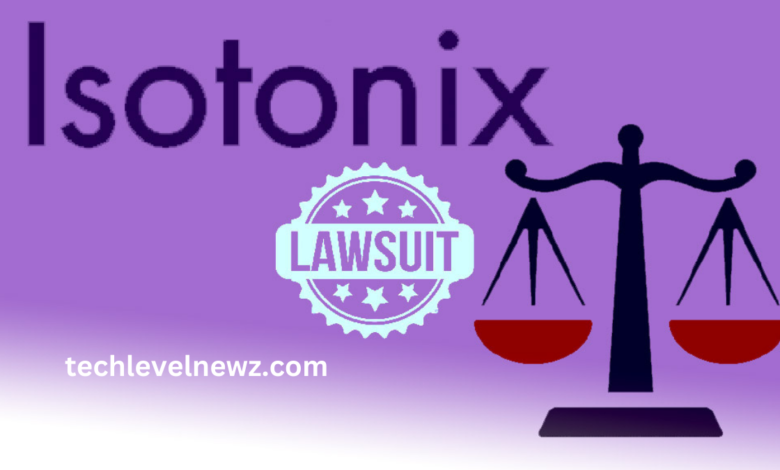Isotonix Lawsuit: Everything You Need to Know

Introduction
Isotonix lawsuit, a popular brand of health supplements, has gained significant attention due to its unique delivery system and association with Market America, a multi-level marketing (MLM) company. While many consumers and distributors praise the brand for its high-quality products, it has also faced scrutiny over legal allegations that question its business practices and marketing strategies.
The Isotonix lawsuit has sparked discussions among consumers, legal experts, and the supplement industry as a whole. Allegations range from misleading advertising to potential violations of consumer protection laws. Given the growing number of lawsuits in the health and wellness industry, it is crucial to understand the claims made against Isotonix and their potential impact.
This article will provide an in-depth look at the lawsuit, its background, legal implications, and what it means for Isotonix customers and distributors. By the end of this article, readers will have a clearer picture of whether the controversy surrounding Isotonix should be a cause for concern.
Background on Isotonix
Isotonix is a well-known dietary supplement brand developed by Market America, a global MLM company specializing in health, nutrition, and beauty products. The brand differentiates itself by offering isotonic-capable supplements, which are said to enhance nutrient absorption. This unique selling point has made Isotonix a preferred choice among health-conscious individuals.
Market America, founded in 1992 by JR Ridinger, has built its business model around independent distributors who sell Isotonix products while also recruiting new members. This MLM structure has contributed to the company’s rapid expansion but has also led to skepticism regarding its business ethics. Critics argue that such models often prioritize recruitment over genuine product sales, raising concerns about sustainability and legality.
Over the years, Isotonix has received praise for its high-quality ingredients and innovative formulations. However, the company has also faced criticism regarding its health claims, pricing strategies, and marketing practices. These concerns have played a role in the emergence of legal disputes, ultimately leading to the current lawsuit.
Understanding the Isotonix Lawsuit
The lawsuit against Isotonix revolves around several key allegations, with claims that the company engaged in misleading advertising, deceptive business practices, and potential violations of consumer protection laws. The legal battle has brought attention to the fine line between aggressive marketing and false claims within the supplement industry.
One of the primary issues in the lawsuit is the accuracy of Isotonix’s marketing claims. The brand has often emphasized its superior absorption rates compared to traditional supplements, suggesting that its products offer enhanced benefits. However, critics argue that these claims are not sufficiently backed by scientific evidence. Regulatory bodies have become increasingly vigilant about such claims, as exaggerated health benefits can mislead consumers into making uninformed purchasing decisions.
Additionally, Market America’s MLM structure has raised concerns about its legality. Some critics have accused the company of operating as a pyramid scheme, where recruitment is prioritized over product sales. While Market America has denied these allegations, similar legal actions have been taken against other MLM companies in the past. The outcome of the Isotonix lawsuit could set a precedent for future cases involving MLM-based supplement brands isotonix lawsuit.
Legal and Consumer Implications
The Isotonix lawsuit has significant implications for both the company and its customers. If the allegations are proven in court, Market America may face financial penalties, changes in business practices, or even restrictions on certain marketing claims. These outcomes could impact the availability and perception of Isotonix products.
For consumers, the lawsuit raises questions about product transparency and trust in the supplement industry. The case highlights the importance of thoroughly researching supplement brands before making a purchase. Customers who have relied on Isotonix products for their health and wellness may need to reassess their choices based on the lawsuit’s findings.
From a legal standpoint, this case could influence how regulatory agencies handle MLM-based supplement companies. If the lawsuit results in stricter regulations, other similar companies may be forced to reconsider their business models and marketing strategies. This could lead to greater transparency and consumer protection within the supplement industry isotonix lawsuit.
Public and Media Reactions
The Isotonix lawsuit has sparked discussions across various media platforms, with news outlets, health experts, and consumers weighing in on the controversy. While some media sources have defended Isotonix’s reputation, others have criticized the brand for its alleged deceptive practices isotonix lawsuit.
Consumer reactions have been mixed, with some loyal customers standing by the brand and others expressing concerns about the credibility of its claims. Social media platforms have played a significant role in shaping public opinion, with discussions about the lawsuit spreading across forums, review sites, and health blogs.
Legal experts have also shared their perspectives on the case, highlighting the broader implications for the supplement industry. The lawsuit serves as a reminder that companies must be cautious in their marketing claims and ensure compliance with industry regulations. As the case unfolds, media coverage and public sentiment will continue to evolve, potentially influencing the outcome isotonix lawsuit.
What This Means for Isotonix Users and Distributors
For Isotonix users, the lawsuit raises important questions about product reliability and business ethics. While the brand’s supplements may still be effective for some individuals, it is crucial for consumers to be aware of potential misleading claims and conduct their own research. Consulting healthcare professionals before using any supplement remains the best practice.
Distributors of Isotonix products also face challenges in light of the lawsuit. Many MLM participants rely on their business as a source of income, and legal disputes can create uncertainty about the company’s stability. Distributors should stay informed about the case and consider diversifying their income sources to mitigate potential risks.
For those looking for alternatives, there are numerous reputable supplement brands available that offer scientifically backed products without the complications of an MLM structure. Consumers should prioritize brands with transparent ingredient lists, third-party testing, and strong scientific backing to ensure they are making informed health decisions isotonix lawsuit.
Conclusion
The Isotonix lawsuit is a significant development in the supplement industry, highlighting concerns about misleading marketing, MLM structures, and consumer protection. While Isotonix has been a popular brand for years, the legal challenges it faces may impact its reputation and business model.
Consumers and distributors must stay informed and critically evaluate the claims made by supplement companies. The case serves as a reminder that scientific evidence, transparency, and ethical business practices are crucial in the health and wellness industry. Regardless of the lawsuit’s outcome, it is essential for individuals to make well-researched decisions when it comes to their health isotonix lawsuit.
Also Read: golden tulip sfax
